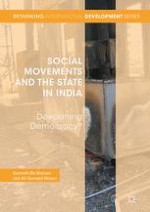2016 | OriginalPaper | Chapter
7. Turbid Transparency: Retelling the Story of the Right to Information Act in India
Author : Prashant Sharma
Published in: Social Movements and the State in India
Publisher: Palgrave Macmillan UK
Activate our intelligent search to find suitable subject content or patents.
Select sections of text to find matching patents with Artificial Intelligence. powered by
Select sections of text to find additional relevant content using AI-assisted search. powered by
